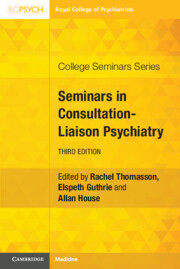Book contents
- Seminars in Consultation-Liaison Psychiatry
- College Seminars Series
- Seminars in Consultation-Liaison Psychiatry
- Copyright page
- Contents
- Contributors
- Chapter 1 The Assessment Process in Consultation-Liaison Psychiatry
- Chapter 2 Notes on Training Pathways in Consultation-Liaison Psychiatry
- Chapter 3 Nursing in Consultation-Liaison Settings
- Chapter 4 Psychological Reaction to Physical Illness
- Chapter 5 Self-Harm and Suicidal Thoughts
- Chapter 6 Depression in Medical Settings
- Chapter 7 Functional Somatic Symptoms
- Chapter 8 Alcohol Misuse
- Chapter 9 Substance Misuse
- Chapter 10 Psychosis in General Hospital Settings
- Chapter 11 Acute Behavioural Disturbance in the General Hospital
- Chapter 12 The Neurology–Psychiatry Interface
- Chapter 13 Perinatal Psychiatry
- Chapter 14 Paediatric Consultation-Liaison Psychiatry
- Chapter 15 Psychological Treatment
- Chapter 16 Legal and Ethical Issues in Consultation-Liaison Psychiatry
- Chapter 17 Social Aspects of Consultation-Liaison Psychiatry
- Chapter 18 Education for Acute Hospital Staff
- Chapter 19 Considerations in the Planning and Delivery of Consultation-Liaison Psychiatry Services
- Chapter 20 Outcome Measurement in Consultation-Liaison Psychiatry
- Chapter 21 The Evidence Base for Consultation-Liaison Psychiatry
- Chapter 22 Primary Care Consultation-Liaison Services
- Chapter 23 Emergency Department Psychiatry
- Chapter 24 Setting Standards for Consultation-Liaison Psychiatry Services
- Chapter 25 Policy to Practice
- Chapter 26 Consultation-Liaison Psychiatry
- Index
- References
Chapter 4 - Psychological Reaction to Physical Illness
Published online by Cambridge University Press: 04 January 2024
- Seminars in Consultation-Liaison Psychiatry
- College Seminars Series
- Seminars in Consultation-Liaison Psychiatry
- Copyright page
- Contents
- Contributors
- Chapter 1 The Assessment Process in Consultation-Liaison Psychiatry
- Chapter 2 Notes on Training Pathways in Consultation-Liaison Psychiatry
- Chapter 3 Nursing in Consultation-Liaison Settings
- Chapter 4 Psychological Reaction to Physical Illness
- Chapter 5 Self-Harm and Suicidal Thoughts
- Chapter 6 Depression in Medical Settings
- Chapter 7 Functional Somatic Symptoms
- Chapter 8 Alcohol Misuse
- Chapter 9 Substance Misuse
- Chapter 10 Psychosis in General Hospital Settings
- Chapter 11 Acute Behavioural Disturbance in the General Hospital
- Chapter 12 The Neurology–Psychiatry Interface
- Chapter 13 Perinatal Psychiatry
- Chapter 14 Paediatric Consultation-Liaison Psychiatry
- Chapter 15 Psychological Treatment
- Chapter 16 Legal and Ethical Issues in Consultation-Liaison Psychiatry
- Chapter 17 Social Aspects of Consultation-Liaison Psychiatry
- Chapter 18 Education for Acute Hospital Staff
- Chapter 19 Considerations in the Planning and Delivery of Consultation-Liaison Psychiatry Services
- Chapter 20 Outcome Measurement in Consultation-Liaison Psychiatry
- Chapter 21 The Evidence Base for Consultation-Liaison Psychiatry
- Chapter 22 Primary Care Consultation-Liaison Services
- Chapter 23 Emergency Department Psychiatry
- Chapter 24 Setting Standards for Consultation-Liaison Psychiatry Services
- Chapter 25 Policy to Practice
- Chapter 26 Consultation-Liaison Psychiatry
- Index
- References
Summary
Physical illness is stressful; however, given time and support, most people manage to adjust and cope with serious physical illness without the need for psychological intervention. Psychological reaction to physical illness refers to a set of cognitive, emotional and behavioural responses which are triggered by the development of physical symptoms or a diagnosis of a physical condition by a healthcare professional. Experiencing and living with illness is a dynamic process and it takes time to assimilate new information, manage feelings and make appropriate adjustments to family and social circumstances. Chronic physical illness usually involves having to make a sequential series of psychological adjustments as the disease progresses.
- Type
- Chapter
- Information
- Seminars in Consultation-Liaison Psychiatry , pp. 48 - 60Publisher: Cambridge University PressPrint publication year: 2024



